ACCT 350: Ethics and Fraud Detection in Accounting - A Detailed Essay
VerifiedAdded on 2023/06/14
|9
|1546
|267
Essay
AI Summary
This essay reflects on the importance of professionalism, standards, and ethical codes of conduct in preventing, detecting, and investigating fraud. It includes a self-assessment related to a professional code of conduct, a reflection on personal ethical codes, and an analysis of a real-life ethical challenge, specifically the Wirick-Gill mortgage fraud case. The essay applies rational choice and strain theories to understand the case, concluding with the benefits gained from the ACCT 350 course in developing knowledge about relevant codes of ethics and suggesting the development of new standards to address global challenges. Desklib offers a range of resources, including past papers and solved assignments, to support students in their studies.
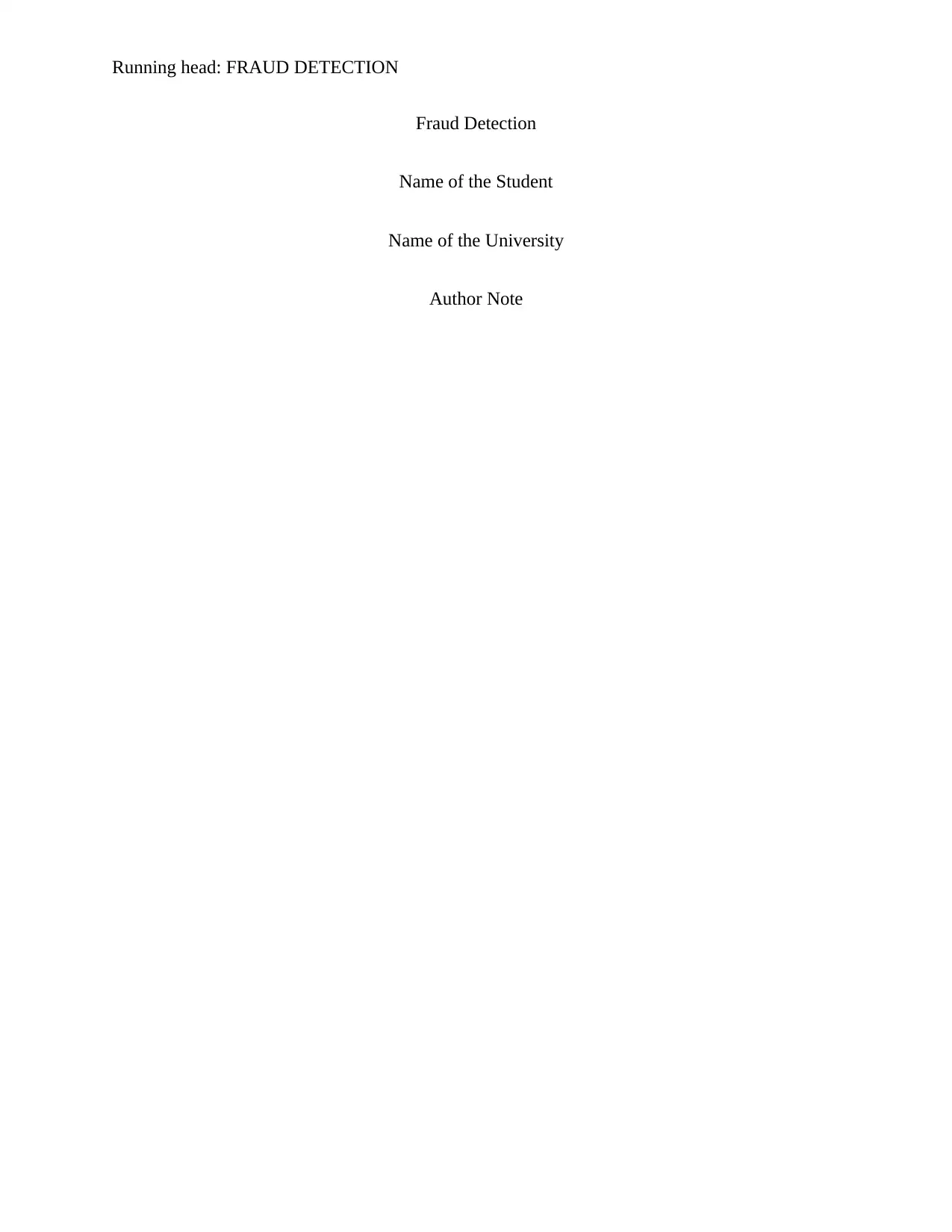
Running head: FRAUD DETECTION
Fraud Detection
Name of the Student
Name of the University
Author Note
Fraud Detection
Name of the Student
Name of the University
Author Note
Paraphrase This Document
Need a fresh take? Get an instant paraphrase of this document with our AI Paraphraser
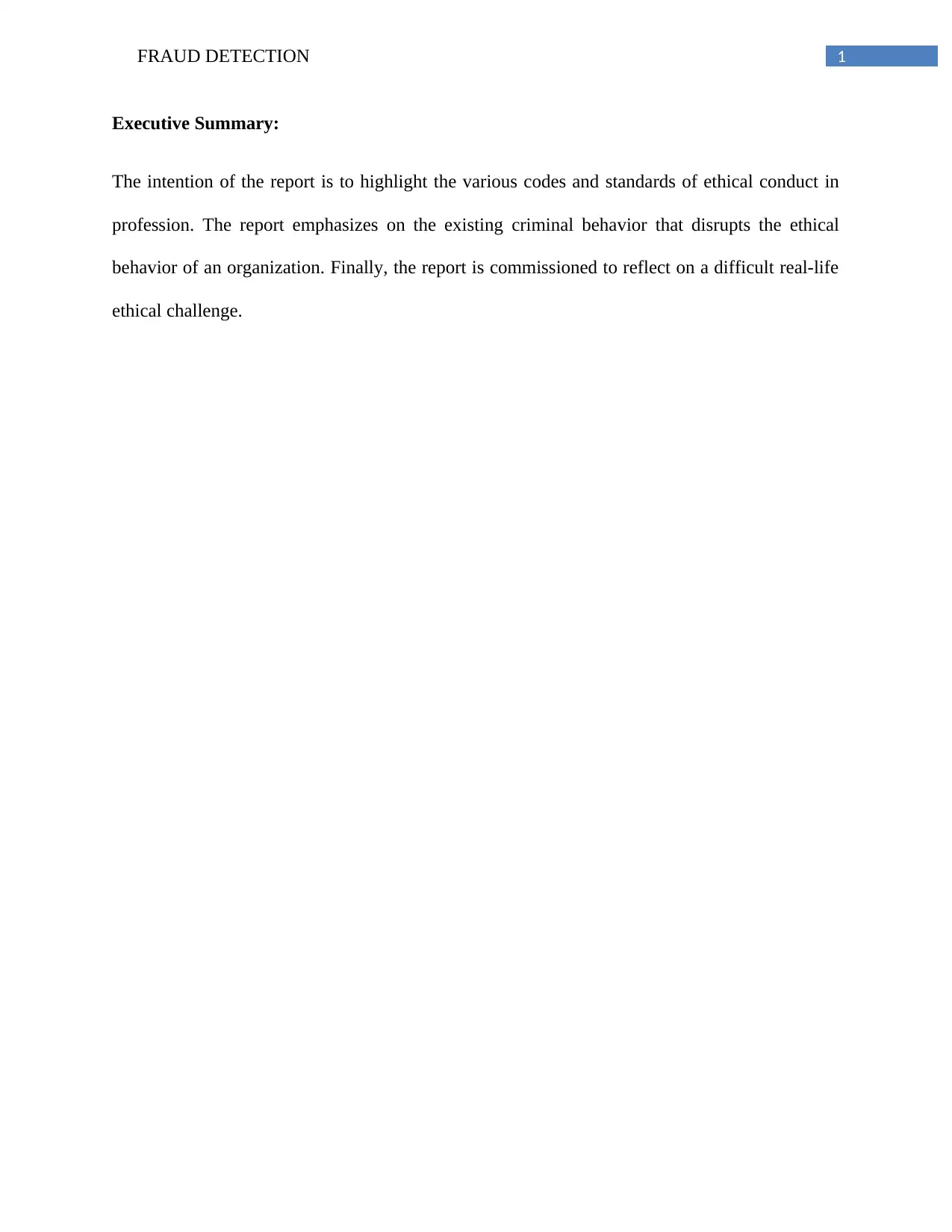
1FRAUD DETECTION
Executive Summary:
The intention of the report is to highlight the various codes and standards of ethical conduct in
profession. The report emphasizes on the existing criminal behavior that disrupts the ethical
behavior of an organization. Finally, the report is commissioned to reflect on a difficult real-life
ethical challenge.
Executive Summary:
The intention of the report is to highlight the various codes and standards of ethical conduct in
profession. The report emphasizes on the existing criminal behavior that disrupts the ethical
behavior of an organization. Finally, the report is commissioned to reflect on a difficult real-life
ethical challenge.
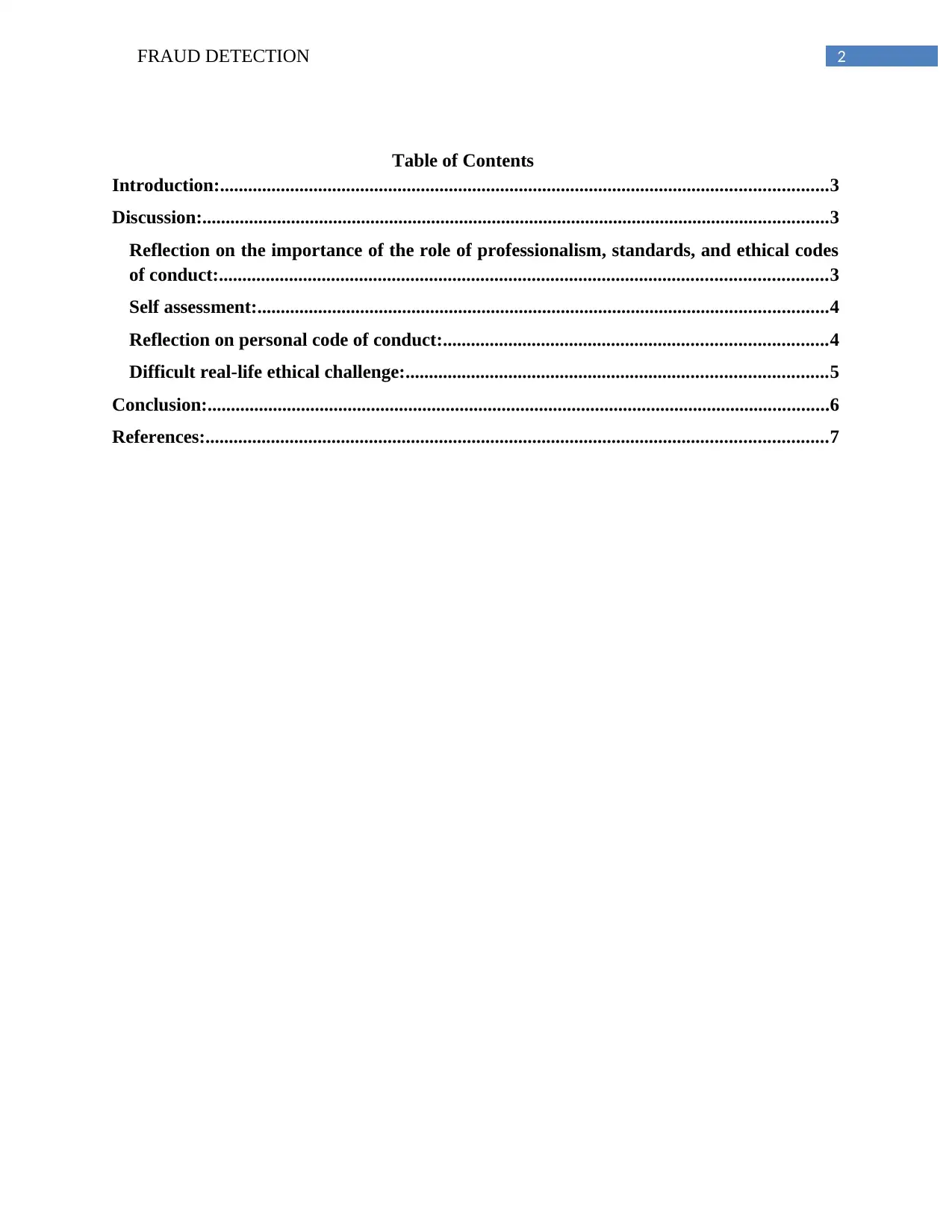
2FRAUD DETECTION
Table of Contents
Introduction:..................................................................................................................................3
Discussion:......................................................................................................................................3
Reflection on the importance of the role of professionalism, standards, and ethical codes
of conduct:..................................................................................................................................3
Self assessment:..........................................................................................................................4
Reflection on personal code of conduct:..................................................................................4
Difficult real-life ethical challenge:..........................................................................................5
Conclusion:.....................................................................................................................................6
References:.....................................................................................................................................7
Table of Contents
Introduction:..................................................................................................................................3
Discussion:......................................................................................................................................3
Reflection on the importance of the role of professionalism, standards, and ethical codes
of conduct:..................................................................................................................................3
Self assessment:..........................................................................................................................4
Reflection on personal code of conduct:..................................................................................4
Difficult real-life ethical challenge:..........................................................................................5
Conclusion:.....................................................................................................................................6
References:.....................................................................................................................................7
⊘ This is a preview!⊘
Do you want full access?
Subscribe today to unlock all pages.

Trusted by 1+ million students worldwide
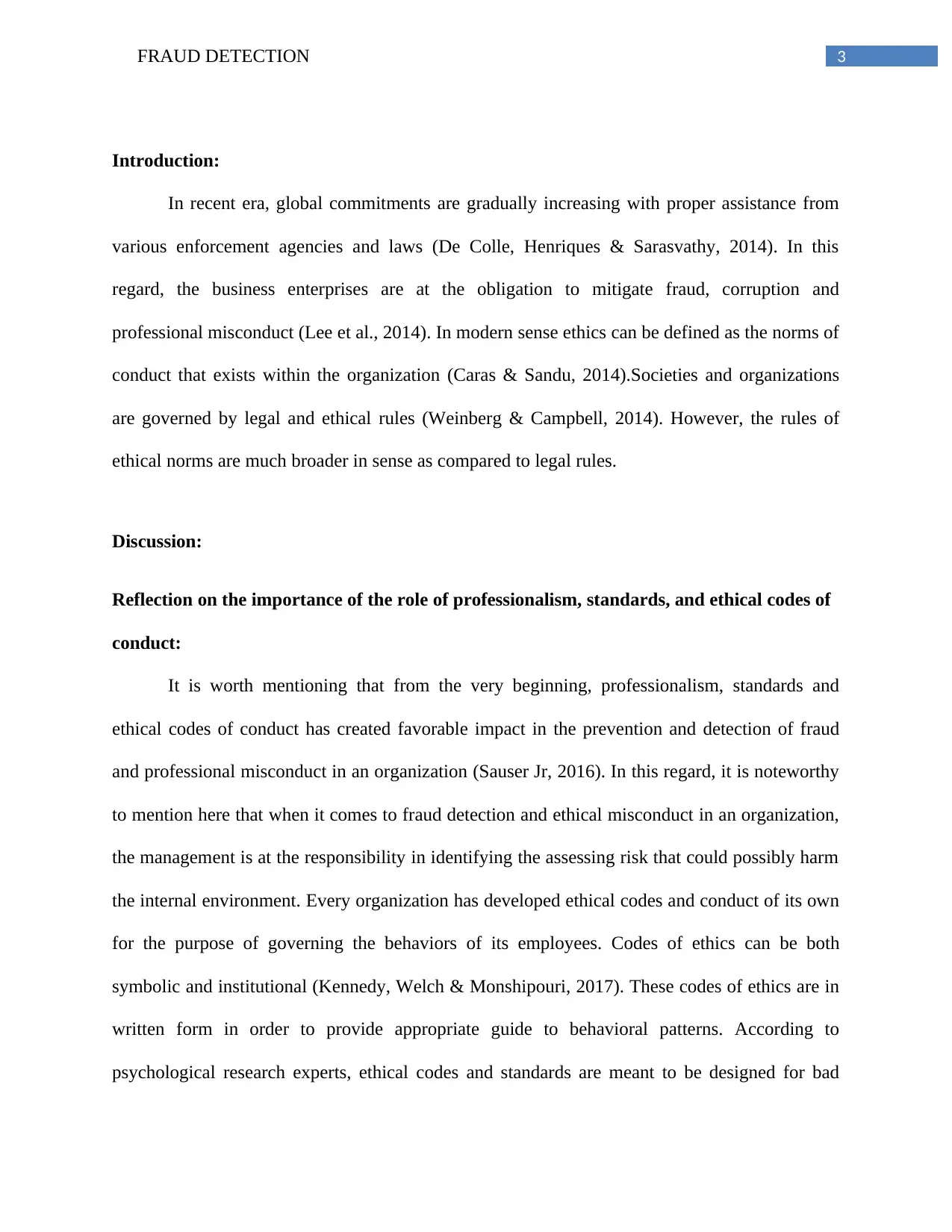
3FRAUD DETECTION
Introduction:
In recent era, global commitments are gradually increasing with proper assistance from
various enforcement agencies and laws (De Colle, Henriques & Sarasvathy, 2014). In this
regard, the business enterprises are at the obligation to mitigate fraud, corruption and
professional misconduct (Lee et al., 2014). In modern sense ethics can be defined as the norms of
conduct that exists within the organization (Caras & Sandu, 2014).Societies and organizations
are governed by legal and ethical rules (Weinberg & Campbell, 2014). However, the rules of
ethical norms are much broader in sense as compared to legal rules.
Discussion:
Reflection on the importance of the role of professionalism, standards, and ethical codes of
conduct:
It is worth mentioning that from the very beginning, professionalism, standards and
ethical codes of conduct has created favorable impact in the prevention and detection of fraud
and professional misconduct in an organization (Sauser Jr, 2016). In this regard, it is noteworthy
to mention here that when it comes to fraud detection and ethical misconduct in an organization,
the management is at the responsibility in identifying the assessing risk that could possibly harm
the internal environment. Every organization has developed ethical codes and conduct of its own
for the purpose of governing the behaviors of its employees. Codes of ethics can be both
symbolic and institutional (Kennedy, Welch & Monshipouri, 2017). These codes of ethics are in
written form in order to provide appropriate guide to behavioral patterns. According to
psychological research experts, ethical codes and standards are meant to be designed for bad
Introduction:
In recent era, global commitments are gradually increasing with proper assistance from
various enforcement agencies and laws (De Colle, Henriques & Sarasvathy, 2014). In this
regard, the business enterprises are at the obligation to mitigate fraud, corruption and
professional misconduct (Lee et al., 2014). In modern sense ethics can be defined as the norms of
conduct that exists within the organization (Caras & Sandu, 2014).Societies and organizations
are governed by legal and ethical rules (Weinberg & Campbell, 2014). However, the rules of
ethical norms are much broader in sense as compared to legal rules.
Discussion:
Reflection on the importance of the role of professionalism, standards, and ethical codes of
conduct:
It is worth mentioning that from the very beginning, professionalism, standards and
ethical codes of conduct has created favorable impact in the prevention and detection of fraud
and professional misconduct in an organization (Sauser Jr, 2016). In this regard, it is noteworthy
to mention here that when it comes to fraud detection and ethical misconduct in an organization,
the management is at the responsibility in identifying the assessing risk that could possibly harm
the internal environment. Every organization has developed ethical codes and conduct of its own
for the purpose of governing the behaviors of its employees. Codes of ethics can be both
symbolic and institutional (Kennedy, Welch & Monshipouri, 2017). These codes of ethics are in
written form in order to provide appropriate guide to behavioral patterns. According to
psychological research experts, ethical codes and standards are meant to be designed for bad
Paraphrase This Document
Need a fresh take? Get an instant paraphrase of this document with our AI Paraphraser
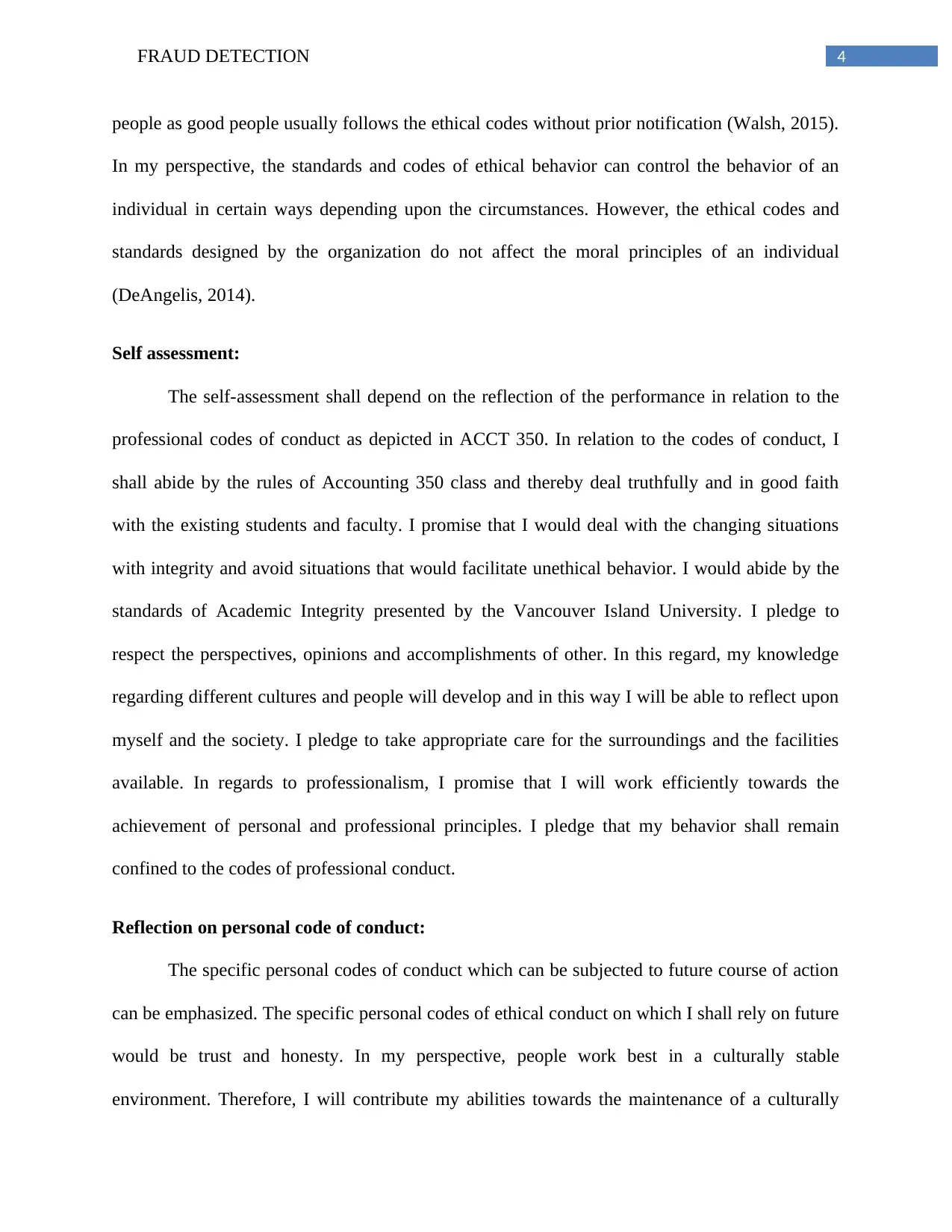
4FRAUD DETECTION
people as good people usually follows the ethical codes without prior notification (Walsh, 2015).
In my perspective, the standards and codes of ethical behavior can control the behavior of an
individual in certain ways depending upon the circumstances. However, the ethical codes and
standards designed by the organization do not affect the moral principles of an individual
(DeAngelis, 2014).
Self assessment:
The self-assessment shall depend on the reflection of the performance in relation to the
professional codes of conduct as depicted in ACCT 350. In relation to the codes of conduct, I
shall abide by the rules of Accounting 350 class and thereby deal truthfully and in good faith
with the existing students and faculty. I promise that I would deal with the changing situations
with integrity and avoid situations that would facilitate unethical behavior. I would abide by the
standards of Academic Integrity presented by the Vancouver Island University. I pledge to
respect the perspectives, opinions and accomplishments of other. In this regard, my knowledge
regarding different cultures and people will develop and in this way I will be able to reflect upon
myself and the society. I pledge to take appropriate care for the surroundings and the facilities
available. In regards to professionalism, I promise that I will work efficiently towards the
achievement of personal and professional principles. I pledge that my behavior shall remain
confined to the codes of professional conduct.
Reflection on personal code of conduct:
The specific personal codes of conduct which can be subjected to future course of action
can be emphasized. The specific personal codes of ethical conduct on which I shall rely on future
would be trust and honesty. In my perspective, people work best in a culturally stable
environment. Therefore, I will contribute my abilities towards the maintenance of a culturally
people as good people usually follows the ethical codes without prior notification (Walsh, 2015).
In my perspective, the standards and codes of ethical behavior can control the behavior of an
individual in certain ways depending upon the circumstances. However, the ethical codes and
standards designed by the organization do not affect the moral principles of an individual
(DeAngelis, 2014).
Self assessment:
The self-assessment shall depend on the reflection of the performance in relation to the
professional codes of conduct as depicted in ACCT 350. In relation to the codes of conduct, I
shall abide by the rules of Accounting 350 class and thereby deal truthfully and in good faith
with the existing students and faculty. I promise that I would deal with the changing situations
with integrity and avoid situations that would facilitate unethical behavior. I would abide by the
standards of Academic Integrity presented by the Vancouver Island University. I pledge to
respect the perspectives, opinions and accomplishments of other. In this regard, my knowledge
regarding different cultures and people will develop and in this way I will be able to reflect upon
myself and the society. I pledge to take appropriate care for the surroundings and the facilities
available. In regards to professionalism, I promise that I will work efficiently towards the
achievement of personal and professional principles. I pledge that my behavior shall remain
confined to the codes of professional conduct.
Reflection on personal code of conduct:
The specific personal codes of conduct which can be subjected to future course of action
can be emphasized. The specific personal codes of ethical conduct on which I shall rely on future
would be trust and honesty. In my perspective, people work best in a culturally stable
environment. Therefore, I will contribute my abilities towards the maintenance of a culturally
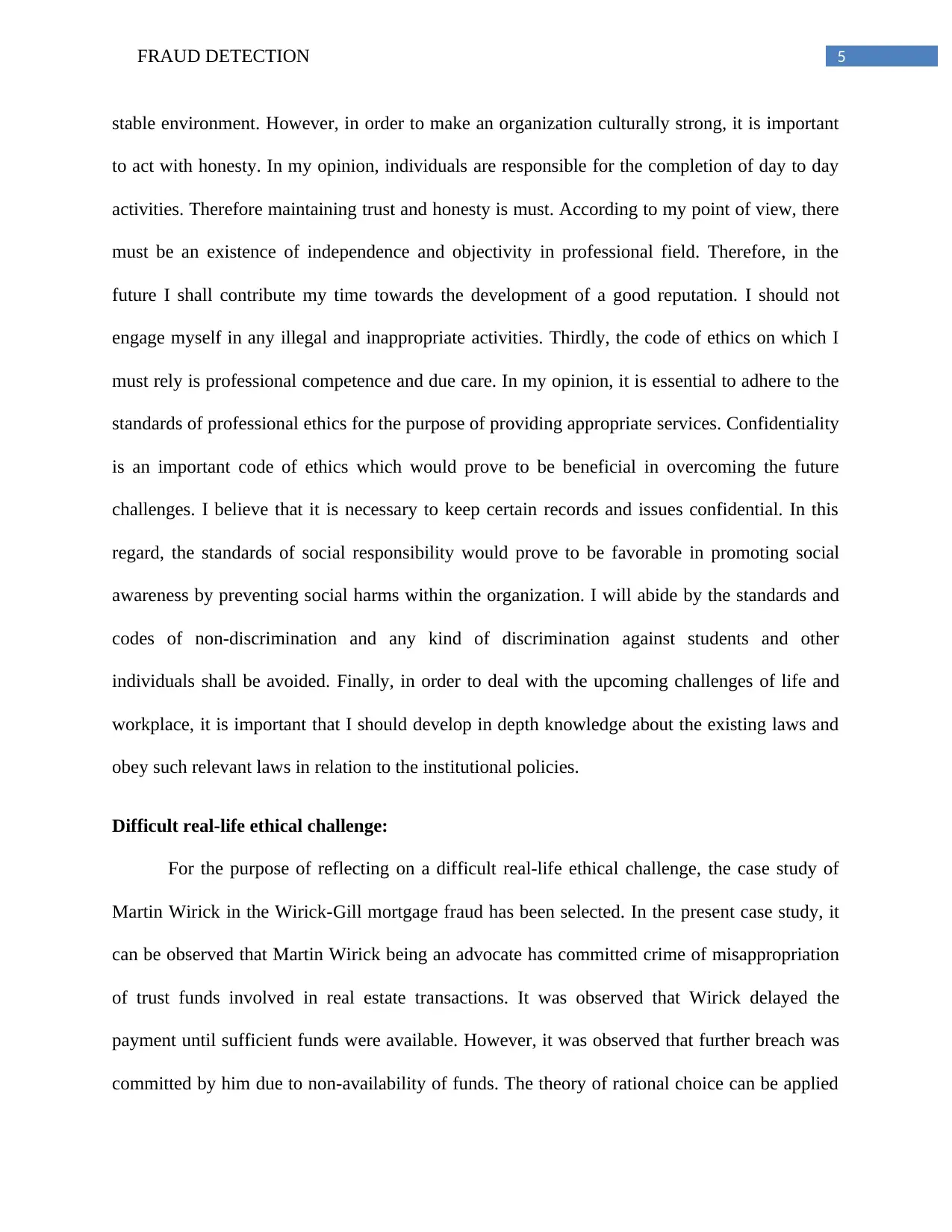
5FRAUD DETECTION
stable environment. However, in order to make an organization culturally strong, it is important
to act with honesty. In my opinion, individuals are responsible for the completion of day to day
activities. Therefore maintaining trust and honesty is must. According to my point of view, there
must be an existence of independence and objectivity in professional field. Therefore, in the
future I shall contribute my time towards the development of a good reputation. I should not
engage myself in any illegal and inappropriate activities. Thirdly, the code of ethics on which I
must rely is professional competence and due care. In my opinion, it is essential to adhere to the
standards of professional ethics for the purpose of providing appropriate services. Confidentiality
is an important code of ethics which would prove to be beneficial in overcoming the future
challenges. I believe that it is necessary to keep certain records and issues confidential. In this
regard, the standards of social responsibility would prove to be favorable in promoting social
awareness by preventing social harms within the organization. I will abide by the standards and
codes of non-discrimination and any kind of discrimination against students and other
individuals shall be avoided. Finally, in order to deal with the upcoming challenges of life and
workplace, it is important that I should develop in depth knowledge about the existing laws and
obey such relevant laws in relation to the institutional policies.
Difficult real-life ethical challenge:
For the purpose of reflecting on a difficult real-life ethical challenge, the case study of
Martin Wirick in the Wirick-Gill mortgage fraud has been selected. In the present case study, it
can be observed that Martin Wirick being an advocate has committed crime of misappropriation
of trust funds involved in real estate transactions. It was observed that Wirick delayed the
payment until sufficient funds were available. However, it was observed that further breach was
committed by him due to non-availability of funds. The theory of rational choice can be applied
stable environment. However, in order to make an organization culturally strong, it is important
to act with honesty. In my opinion, individuals are responsible for the completion of day to day
activities. Therefore maintaining trust and honesty is must. According to my point of view, there
must be an existence of independence and objectivity in professional field. Therefore, in the
future I shall contribute my time towards the development of a good reputation. I should not
engage myself in any illegal and inappropriate activities. Thirdly, the code of ethics on which I
must rely is professional competence and due care. In my opinion, it is essential to adhere to the
standards of professional ethics for the purpose of providing appropriate services. Confidentiality
is an important code of ethics which would prove to be beneficial in overcoming the future
challenges. I believe that it is necessary to keep certain records and issues confidential. In this
regard, the standards of social responsibility would prove to be favorable in promoting social
awareness by preventing social harms within the organization. I will abide by the standards and
codes of non-discrimination and any kind of discrimination against students and other
individuals shall be avoided. Finally, in order to deal with the upcoming challenges of life and
workplace, it is important that I should develop in depth knowledge about the existing laws and
obey such relevant laws in relation to the institutional policies.
Difficult real-life ethical challenge:
For the purpose of reflecting on a difficult real-life ethical challenge, the case study of
Martin Wirick in the Wirick-Gill mortgage fraud has been selected. In the present case study, it
can be observed that Martin Wirick being an advocate has committed crime of misappropriation
of trust funds involved in real estate transactions. It was observed that Wirick delayed the
payment until sufficient funds were available. However, it was observed that further breach was
committed by him due to non-availability of funds. The theory of rational choice can be applied
⊘ This is a preview!⊘
Do you want full access?
Subscribe today to unlock all pages.

Trusted by 1+ million students worldwide
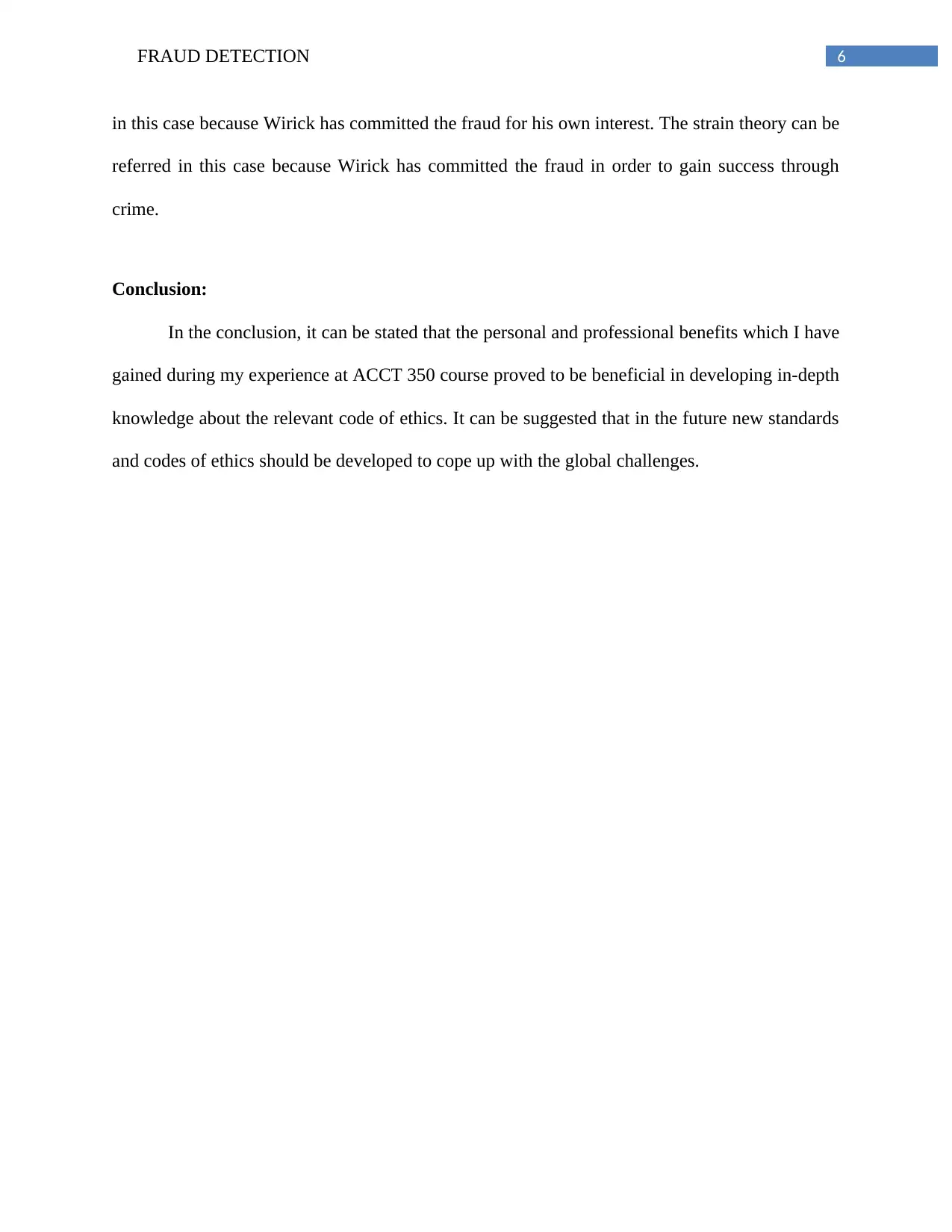
6FRAUD DETECTION
in this case because Wirick has committed the fraud for his own interest. The strain theory can be
referred in this case because Wirick has committed the fraud in order to gain success through
crime.
Conclusion:
In the conclusion, it can be stated that the personal and professional benefits which I have
gained during my experience at ACCT 350 course proved to be beneficial in developing in-depth
knowledge about the relevant code of ethics. It can be suggested that in the future new standards
and codes of ethics should be developed to cope up with the global challenges.
in this case because Wirick has committed the fraud for his own interest. The strain theory can be
referred in this case because Wirick has committed the fraud in order to gain success through
crime.
Conclusion:
In the conclusion, it can be stated that the personal and professional benefits which I have
gained during my experience at ACCT 350 course proved to be beneficial in developing in-depth
knowledge about the relevant code of ethics. It can be suggested that in the future new standards
and codes of ethics should be developed to cope up with the global challenges.
Paraphrase This Document
Need a fresh take? Get an instant paraphrase of this document with our AI Paraphraser
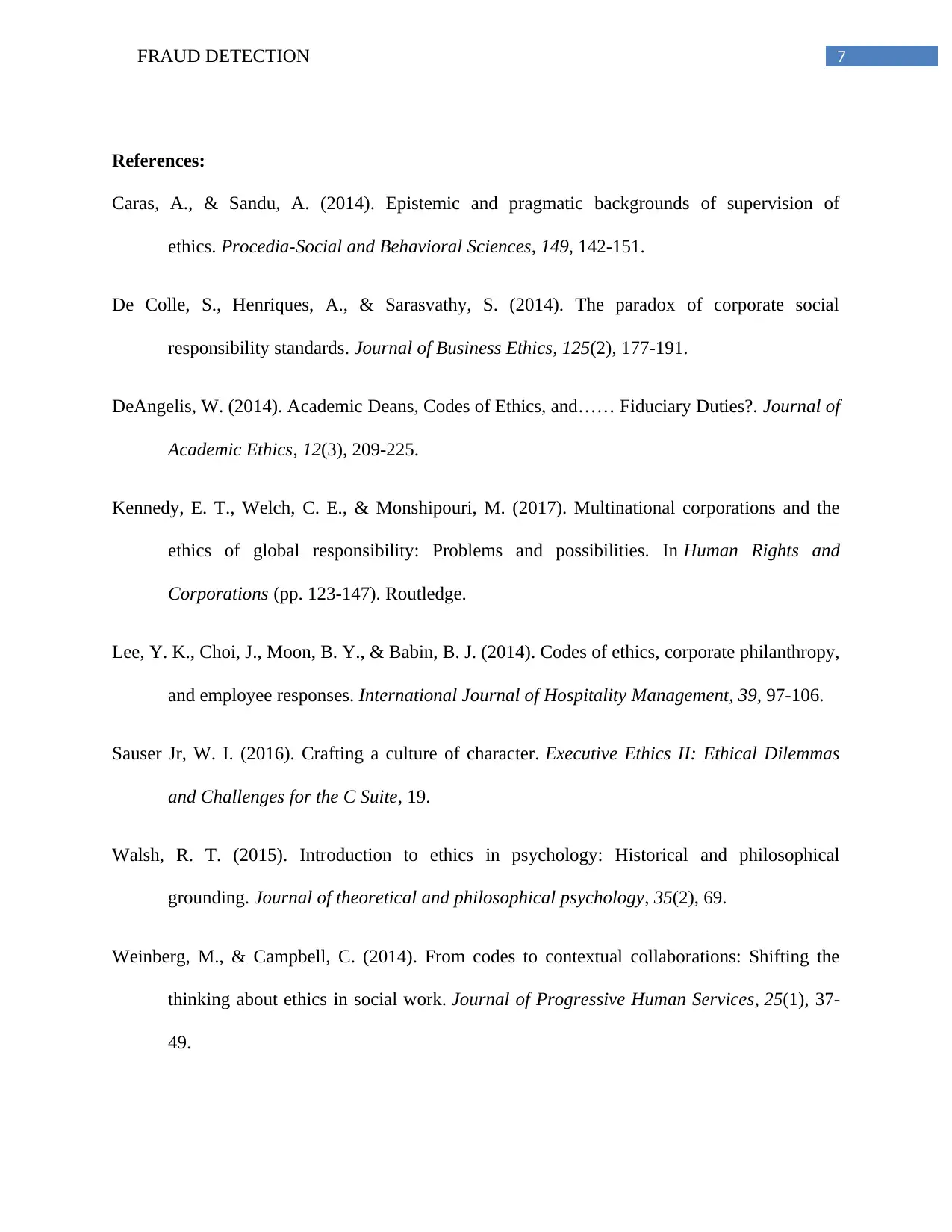
7FRAUD DETECTION
References:
Caras, A., & Sandu, A. (2014). Epistemic and pragmatic backgrounds of supervision of
ethics. Procedia-Social and Behavioral Sciences, 149, 142-151.
De Colle, S., Henriques, A., & Sarasvathy, S. (2014). The paradox of corporate social
responsibility standards. Journal of Business Ethics, 125(2), 177-191.
DeAngelis, W. (2014). Academic Deans, Codes of Ethics, and…… Fiduciary Duties?. Journal of
Academic Ethics, 12(3), 209-225.
Kennedy, E. T., Welch, C. E., & Monshipouri, M. (2017). Multinational corporations and the
ethics of global responsibility: Problems and possibilities. In Human Rights and
Corporations (pp. 123-147). Routledge.
Lee, Y. K., Choi, J., Moon, B. Y., & Babin, B. J. (2014). Codes of ethics, corporate philanthropy,
and employee responses. International Journal of Hospitality Management, 39, 97-106.
Sauser Jr, W. I. (2016). Crafting a culture of character. Executive Ethics II: Ethical Dilemmas
and Challenges for the C Suite, 19.
Walsh, R. T. (2015). Introduction to ethics in psychology: Historical and philosophical
grounding. Journal of theoretical and philosophical psychology, 35(2), 69.
Weinberg, M., & Campbell, C. (2014). From codes to contextual collaborations: Shifting the
thinking about ethics in social work. Journal of Progressive Human Services, 25(1), 37-
49.
References:
Caras, A., & Sandu, A. (2014). Epistemic and pragmatic backgrounds of supervision of
ethics. Procedia-Social and Behavioral Sciences, 149, 142-151.
De Colle, S., Henriques, A., & Sarasvathy, S. (2014). The paradox of corporate social
responsibility standards. Journal of Business Ethics, 125(2), 177-191.
DeAngelis, W. (2014). Academic Deans, Codes of Ethics, and…… Fiduciary Duties?. Journal of
Academic Ethics, 12(3), 209-225.
Kennedy, E. T., Welch, C. E., & Monshipouri, M. (2017). Multinational corporations and the
ethics of global responsibility: Problems and possibilities. In Human Rights and
Corporations (pp. 123-147). Routledge.
Lee, Y. K., Choi, J., Moon, B. Y., & Babin, B. J. (2014). Codes of ethics, corporate philanthropy,
and employee responses. International Journal of Hospitality Management, 39, 97-106.
Sauser Jr, W. I. (2016). Crafting a culture of character. Executive Ethics II: Ethical Dilemmas
and Challenges for the C Suite, 19.
Walsh, R. T. (2015). Introduction to ethics in psychology: Historical and philosophical
grounding. Journal of theoretical and philosophical psychology, 35(2), 69.
Weinberg, M., & Campbell, C. (2014). From codes to contextual collaborations: Shifting the
thinking about ethics in social work. Journal of Progressive Human Services, 25(1), 37-
49.
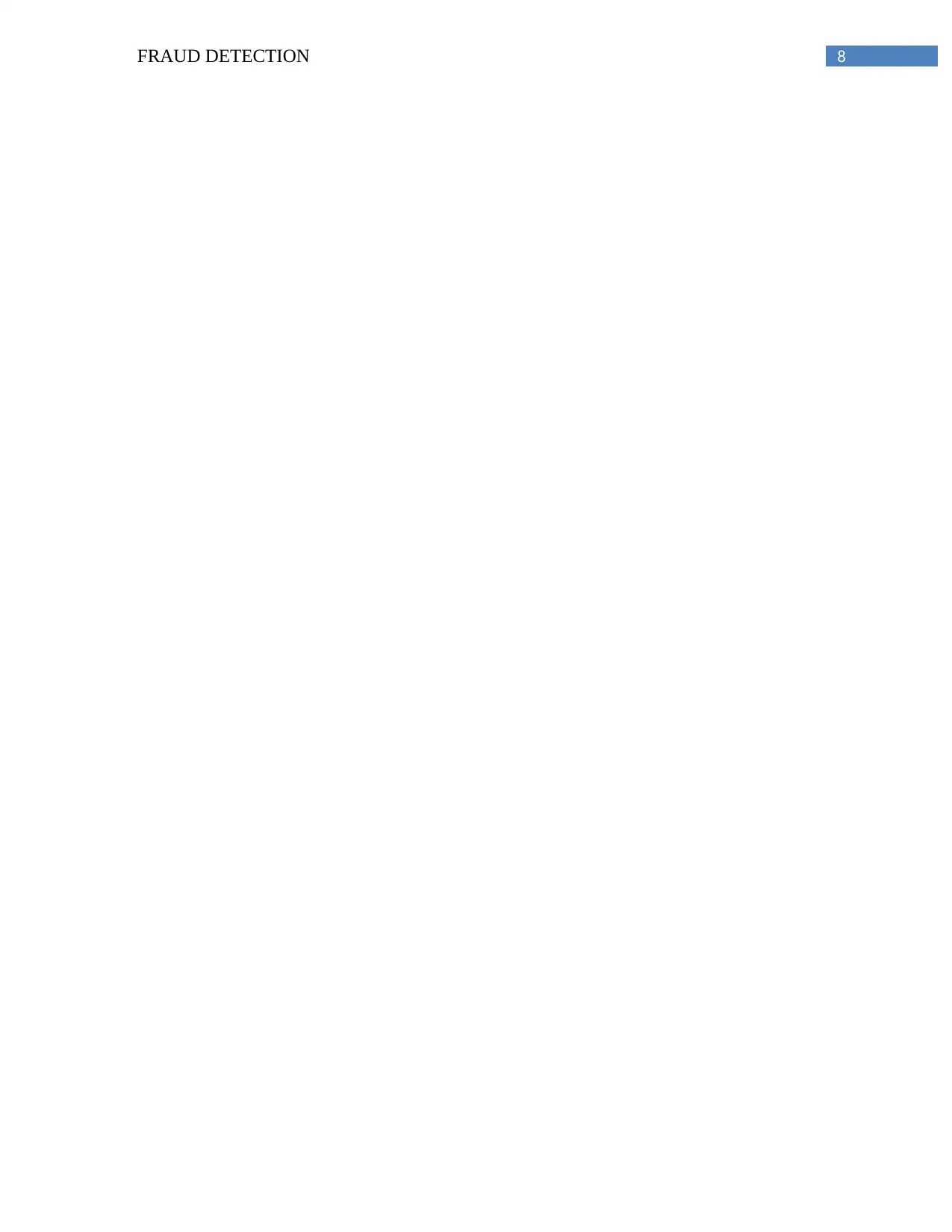
8FRAUD DETECTION
⊘ This is a preview!⊘
Do you want full access?
Subscribe today to unlock all pages.

Trusted by 1+ million students worldwide
1 out of 9
Related Documents
Your All-in-One AI-Powered Toolkit for Academic Success.
+13062052269
info@desklib.com
Available 24*7 on WhatsApp / Email
![[object Object]](/_next/static/media/star-bottom.7253800d.svg)
Unlock your academic potential
Copyright © 2020–2026 A2Z Services. All Rights Reserved. Developed and managed by ZUCOL.





